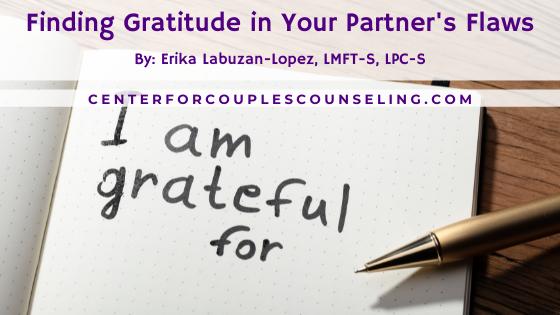Finding Gratitude in Your Partner's Flaws
One of the best aspects of being a couple’s therapist is that you get insight into other couples’ dynamics. Although most people play the comparison game in terms of their relationship, I’m here to say you’ll always lose. When you get the inside view on how marriages are really going, it widens your perspective. I am humbled and grateful to be let in on the most vulnerable and most joyous parts of my clients’ marriages. The most valuable piece I’ve learned from sitting with the amazing humans that are working on their relationship is to embrace my own flaws…and my partner’s.
The truth is all couples are different, have unique dynamics, and varying needs. It is never (I’m willing to break the rule of always or never in this case) helpful to compare your relationship to another because it can’t possibly be compared, and yet it’s human nature to do so. Having the inside scoop, I can tell you every relationship, regardless of what it looks like on the outside, has issues. That’s part of the human condition, and honestly, it’d be boring if everything was perfect all the time. We’d create problems out of thin air that don’t exist…because of humanity and science.
The Hedonic Treadmill
As people, we are susceptible to the hedonic treadmill. The hedonic treadmill says that when things get into a rhythm of homeostasis, where things are generally remaining the same and staying in motion, our brain switches into a state of growth and change. We start looking for things to fix, because our brains feel like it needs to pursue the next goal or stage in life.
In many cases, this is helpful because it pushes us to self-evaluate and grow as people. It also causes problems in relationships, like picking at our partner, constantly analyzing the state of the relationship, and not acknowledging or being unappreciative of the positive changes that have occurred. I’d challenge that we are often exactly where we need to be when we need to be there, and the way to calm our overactive searching/scanning brain is to practice gratitude – specifically gratitude for our partner’s flaws.
The Placemats
My relationship is good, but far from perfect. I am human and can tend to focus on my partner’s flaws, which is often put into perspective when I see the serious issues that couples (or friends or family or people at Target) are going through, and it shifts how I think about my own partner’s annoyances and short comings. I’m able to see things he does that might be off putting in a different light once I’m able to engage my gratitude mindset and reframe the context of the situation, which also allows my hyper-aware brain to take a much-needed rest.
For example, last week we got a new breakfast table for our house after our old one had gotten ruined by years of young children and sticky hands…you get the picture. I realized that we were in need of placemats to prevent damage from the get-go, which I mentioned while we were trying to enact our carefully coordinated morning routine to get out the door. Next thing I know, he’s digging in the cabinets moving stuff around and taking what felt like 37 hours to sort through dishes and platters….and pulled out some old placemats.
I’m Grateful for Flaws
I was instantly agitated by the time he was “wasting” until I realized what he was doing, which was creatively thinking of what we already possessed to solve a problem that I had verbally expressed to him. He was not carelessly using our precious morning time on his own selfish task that could have been done later; he was taking care of me. Although I struggle with him interrupting our routine to take care of a trivial task that could be done at another time, I can switch my anxious energy to one of gratitude for having a partner that deeply cares about what I’ve told him. My brain can relax now, I can see my partner cares about me even when he does things differently than I would, and when I hear the stories that will be shared all around me this holiday season, I can feel grateful for my partner’s “flaws.”

